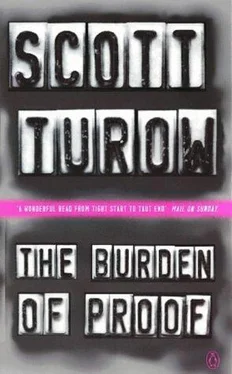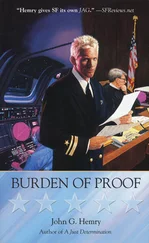Scott Turow - The Burden of Proof
Здесь есть возможность читать онлайн «Scott Turow - The Burden of Proof» весь текст электронной книги совершенно бесплатно (целиком полную версию без сокращений). В некоторых случаях можно слушать аудио, скачать через торрент в формате fb2 и присутствует краткое содержание. Жанр: Детектив, на английском языке. Описание произведения, (предисловие) а так же отзывы посетителей доступны на портале библиотеки ЛибКат.
- Название:The Burden of Proof
- Автор:
- Жанр:
- Год:неизвестен
- ISBN:нет данных
- Рейтинг книги:3 / 5. Голосов: 1
-
Избранное:Добавить в избранное
- Отзывы:
-
Ваша оценка:
- 60
- 1
- 2
- 3
- 4
- 5
The Burden of Proof: краткое содержание, описание и аннотация
Предлагаем к чтению аннотацию, описание, краткое содержание или предисловие (зависит от того, что написал сам автор книги «The Burden of Proof»). Если вы не нашли необходимую информацию о книге — напишите в комментариях, мы постараемся отыскать её.
The Burden of Proof — читать онлайн бесплатно полную книгу (весь текст) целиком
Ниже представлен текст книги, разбитый по страницам. Система сохранения места последней прочитанной страницы, позволяет с удобством читать онлайн бесплатно книгу «The Burden of Proof», без необходимости каждый раз заново искать на чём Вы остановились. Поставьте закладку, и сможете в любой момент перейти на страницу, на которой закончили чтение.
Интервал:
Закладка:
In the dark hall, while Fronz twirled and the players strummed and tooted, he would be alone, free from the need to prattle. Afterwards, the weariness of the work week could overcome him.
"I don't quite know why," Helen told him at intermission, "but I wouldn't have picked you for symphonic music. More quartets," she said,
"or a single guitar." They stood in the lobby, blinking in the sudden lights. Couples Clara and he had seen here for years lifted their hands in greeting.
But no one came near. With an entirely unpredictable force, a gust of grief and remorse blew into Stern, as he realized he had started his new life. For Helen, he smiled ruefully.
"I am indiscriminate." Stern touched his ear, "Tone deaf. I cannot tell the difference between the Kindle symphony and the high-school band." He had kept this fact from Clara for thirty-some years, though when it turned out that Marta could not tell one note from another, she must have entertained suspicions.
"Oh, Sandy." Helen held his wrist as they laughed together at his failings. Why was it that he always forgot how much he liked Helen Dudak until he was beside her? She looked marvelous. Her fox-colored hair had a crisp oufiine that betrayed a trip to the beauty shop, and she wore a simple black dress peeled back from her shoulders. Against all expectation, as the lights went down once more, he found himself pleased to be here.
"So you went to the symphony for all those years and never knew what you were listening to?" asked Helen, as they were driving off afterwards.
She was turned fully about to face him, seated girlishly on her knees.
It was typical of Helen and her instinct for important nuance that she had returned to this subject. They were headed toward her home for dinner. In the end, there was no way to say no. Besides, Helen's company was soothing. And after all his laments over the untmstworthiness of women, he was now fuI1 of a more familiar feeling which they had always reliably satisfied: he was extremely hungry.
"Clara enjoyed it."
"I recall. But" Helen said, then stopped.
"Yes?"
"It's nothing."
"Please."
"I guess I was wondering why you would go now."
"Ah," said Stern, hoping to conjure up some tactful,response, and vaguely frightened to find her so astute. Out the window, the center city flashed by, uninhabited, ghostly in the isolated pools of mercury light, the doorways dark. Helen, to his relief, continued on her own.
"I suppose I was going to give you advice."
"Feel free."
"No," she said. "There's really no comparison between my circumstance and yours."
"Duly noted," Stern said. "You were thinking?"
"Oh, just that, as awful as it is, there are things to enjoy in being alone again. The liberty of it. Finding what's your own."
As the streetlights flowed across her, Helen turned back to measure his response. "I'm sure this is terribly offensive."
"No, no," said Stern. He was eager to agree, pleased to show that he understood her good intentions, and happy to foster the thought that he had suggested the symphony out of some unthinking reflex. And, in fact, this was a valuable notion. A good solid person of real judgment, Helen had hit on something that he otherwise would have missed. Whatever his misery, parts-large parts of him-had accepted his new bachelorhood with relish. Not just the brief period of cavorting. The moment fight now was one more instance-relaxed, at ease, and able to speak about himself in a way Clara seldom encouraged. Clara had her minute agendas, her quiet steps which she always danced.
For many years (Too many years! he thought, and felt again the accustomed iron point of guilt) he had recognized in. some unspoken way that she utilized all this silent plarmingas a means to escape torpor and depression. But the point was that she had done it, he had known it, adjusted to it, and now it was no longer there, like a ticking metronome gone silent. Wounded and reeling, his soul had nonetheless expanded in the recent circumstance, reentering regions closed off for years.
Helen served a splendid supper. She made a salad of shrimp remoulade, and cooked a small piece of blackened fish. She stood over the iron skillet with the smoke rising,. drinking her wine and chatting, like a cooking-show host.
Rick, her younger child, a sophomore now at Easton, dreamed, like many nineteen-year-olds, of being a criminal defense lawyer. Helen relayed his questions. Did Stern believe most of his clients were innocent? How could he defend them if he didn't? How did he feel when he found out they were guilty?
These were old questions, the puzzles of a lifetime, and Stern enjoyed answering Helen, who listened alertly. Some spoke of the nobility of the law. Stern did not believe in that. Too much of the grubby boneshop, the odor of the abattoir, emanated from every courtroom he had entered. It was often a nasty business. But the law, at least, sought to govern misfortune, the slights and injuries of our social existence that were otherwise wholly random. The law's object was to let the seas engulf only those who had been selected for drowning on an orderly basis. In human affairs, reason would never fully triumph; but there was no better cause to champion. Helen sat back, drinking her wine, attentive.
For dessert, she brought out berries. She lifted the wine bottle toward Stern, but he shook it off. Helen had drank freely; Stern had had a single glass. He was drinking too much lately, which never before had been his habit; his head was sore on many occasions.
"As usual," he said, "I have done all the talking; and an way that she utilized all this silent plarmingas a means to escape torpor and depression. But the point was that she had done it, he had known it, adjusted to it, and now it was no longer there, like a ticking metronome gone silent. Wounded and reeling, his soul had nonetheless expanded in the recent circumstance, reentering regions closed off for years.
Helen served a splendid supper. She made a salad of shrimp remoulade, and cooked a small piece of blackened fish. She stood over the iron skillet with the smoke rising,. drinking her wine and chatting, like a cooking-show host.
Rick, her younger child, a sophomore now at Easton, dreamed, like many nineteen-year-olds, of being a criminal defense lawyer. Helen relayed his questions. Did Stern believe most of his clients were innocent? How could he defend them if he didn't? How did he feel when he found out they were guilty?
These were old questions, the puzzles of a lifetime, and Stern enjoyed answering Helen, who listened alertly. Some spoke of the nobility of the law. Stern did not believe in that. Too much of the grubby boneshop, the odor of the abattoir, emanated from every courtroom he had entered. It was often a nasty business. But the law, at least, sought to govern misfortune, the slights and injuries of our social existence that were otherwise wholly random. The law's object was to let the seas engulf only those who had been selected for drowning on an orderly basis. In human affairs, reason would never fully triumph; but there was no better cause to champion. Helen sat back, drinking her wine, attentive.
For dessert, she brought out berries. She lifted the wine bottle toward Stern, but he shook it off. Helen had drank freely; Stern had had a single glass. He was drinking too much lately, which never before had been his habit; his head was sore on many occasions.
"As usual," he said, "I have done all the talking; and about myself."
"You're wonderful to listen to, Sandy. You know that."
"Do I? Well, I appreciate a receptive audience." Helen looked at him dh'ectly.
"You have one here," she said somewhat softly. They were silent, considering one another. "Look," said Helen Dudak.
"You know it. I know it. So I'll say it. I'm available. All right?"
Читать дальшеИнтервал:
Закладка:
Похожие книги на «The Burden of Proof»
Представляем Вашему вниманию похожие книги на «The Burden of Proof» списком для выбора. Мы отобрали схожую по названию и смыслу литературу в надежде предоставить читателям больше вариантов отыскать новые, интересные, ещё непрочитанные произведения.
Обсуждение, отзывы о книге «The Burden of Proof» и просто собственные мнения читателей. Оставьте ваши комментарии, напишите, что Вы думаете о произведении, его смысле или главных героях. Укажите что конкретно понравилось, а что нет, и почему Вы так считаете.












